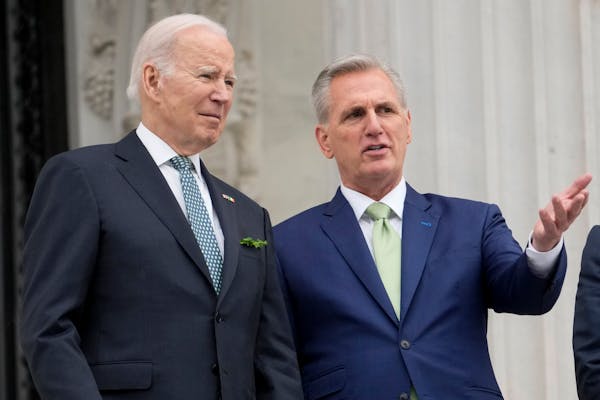Opinion editor's note: Star Tribune Opinion publishes a mix of national and local commentaries online and in print each day. To contribute, click here.
•••
I understand why work requirements for public assistance sound reasonable. We want to make sure people are not getting something for nothing. And I understand why people reading this commentary are likely to be unfamiliar with the reality of work requirements: Very few of us have had to turn to public assistance.
I never have, but I did work in public and nonprofit agencies that served people receiving public assistance for more than 30 years.
I learned that work requirements are not innocuous. The political debt-ceiling deal in Washington will protect our bank accounts, investments and jobs by avoiding a default on our nation's debts. But that same deal will cost some people ongoing access to food and will endanger their health.
More adults without children will have their food assistance (which we used to call food stamps) cut off for three years if they are not working. The assumption behind this and similar policies that make them sound reasonable are very flawed.
The primary assumption behind this policy is that someone is willing to forgo almost $900 in monthly wages from a 20-hour-a-week minimum-wage job in order to get less than $200 in food benefits. Those food benefits can only pay for groceries — not restaurant meals, rent, heating bills or bus fare. The people subject to these requirements — adults without documented barriers to work and without children — are not eligible for any of the income support programs we call "welfare." Waiting lists for public housing are years long.
So we are asked to assume that thousands of people choose to live in destitution because they refuse to work, not because they cannot work.
Our assumptions about who loses food assistance because of these requirements are also wrong. The program is administered by busy and diligent financial assistance workers deeply trained in calculating incomes according to complex rules. They are not trained to do health and employability evaluations.
So it is no surprise that the Minnesota Department of Human Services found in a recent analysis published by Johns Hopkins University Press that 40% of the childless adults cut off from food assistance had very serious mental illnesses. In addition, a third of the adults subject to the time limits had very serious chronic health conditions, such as congestive heart failure, chronic obstructive pulmonary disorder, or chronic kidney failure.
Likewise, the policy that would exempt homeless people from being cut off assumes that eligibility workers will know that someone receiving food assistance has become homeless. Almost a third of the people cut off from food assistance because of work requirements in Minnesota in past years turned out to be homeless.
Nor do the work requirements save the public money. For every month someone is denied food benefits because of work requirements, public expenditures on their health care increase, according to that same state analysis. After losing food assistance, people are hospitalized, end up in emergency rooms and need more outpatient care. Denying unhealthy people access to food makes them sicker, it turns out.
The people turning to food assistance and the families turning to income support are low-wage workers. They worked or have worked in the retail, hotel/restaurant, health care and temp agency sectors. They turn to assistance when they have lost a job and they often continue with assistance at lower levels to supplement their low and inconsistent wages.
Low-wage workers lose jobs at two and a half times the rate of higher paid workers, but are only half as likely to receive unemployment insurance according to a report by the federal Government Accountability Office. These workers do not have sick leave (yet). They do not have short- and long-term leave coverage when their chronic illnesses make work impossible. What the workers without children have had when unemployed is access to a little bit of food assistance.
So what negotiators are describing as a small concession, a small tweak to existing policy, will be devastating to thousands of people in Minnesota. We should at least know what this decision will do, even if we do not have to experience its direct consequences in our own lives.
Deborah Schlick lives in St. Paul.





